Healthiest Breakfast Cereals
This post may contain affiliate links. As an Amazon Associate, I earn from qualifying purchases. Please read my disclosure.Have you looked at the cereal aisle lately? There are seemingly a million types of cereal, many of which claim to be healthy but the nutrition facts panel suggests otherwise. I’m a cereal lover so I set out to find the healthiest cereals on the market today.
My comprehensive guide will help you to find the best healthy cereals to eat that taste great, will keep you full and satisfied, and are actually good for you and your family too! I’m a mom, health coach, and nutritionist, and I have taste-tested every single one of these cereals, so you can be sure that the cereals I’m recommending here are kid-tested and nutritionist-approved!
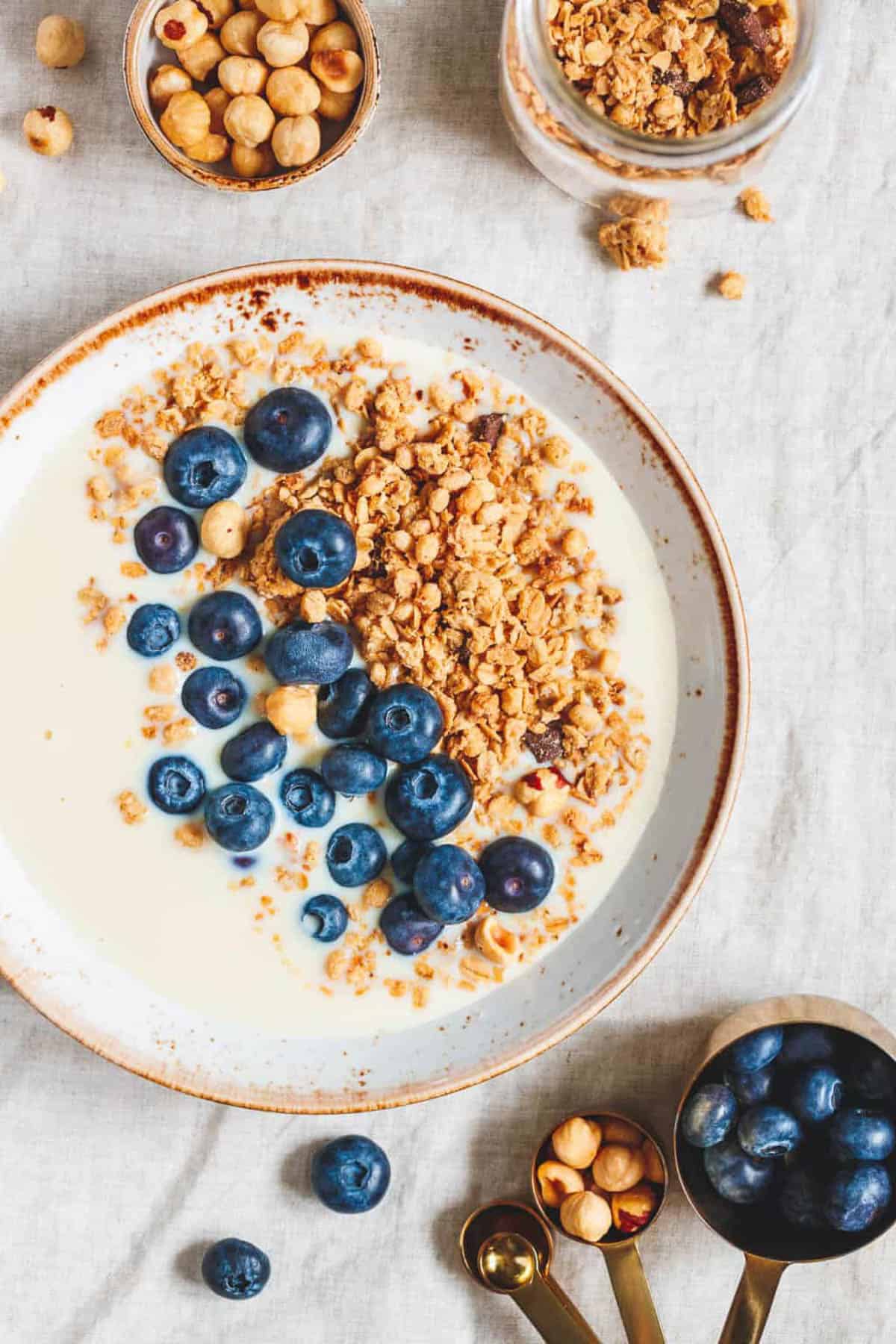
I have always found browsing the cereal aisle in the grocery store to be super overwhelming. There are rows and rows of boxes claiming to be healthy with labels like “whole grain”, “all-natural” and “organic” – but which ones are actually the healthiest?
The good news is that there are plenty of healthy cereals made with wholesome ingredients at most grocery stores! So instead of providing the top 10 healthiest cereals, I rounded up twice as many recommendations to give you plenty of nutritious and delicious options! Read on for my tips and tricks for finding the healthiest cereal, my top 20 best healthy cereal brands, and healthy cereal FAQs.
Your Go-To Guide for the Healthiest Breakfast Cereals
- Best for picky eaters –Three Wishes Unsweetened
- Highest protein – Catalina Crunch Cereal
- Low in sugar – Awsum Snacks SuperCereal
- Free from artificial ingredients – Seven Sundays Sunflower Cereal
- Best organic – Lovebird Organic Grain-Free Cereal
- High in omega 3s – Nature’s Path Flax Plus Flakes
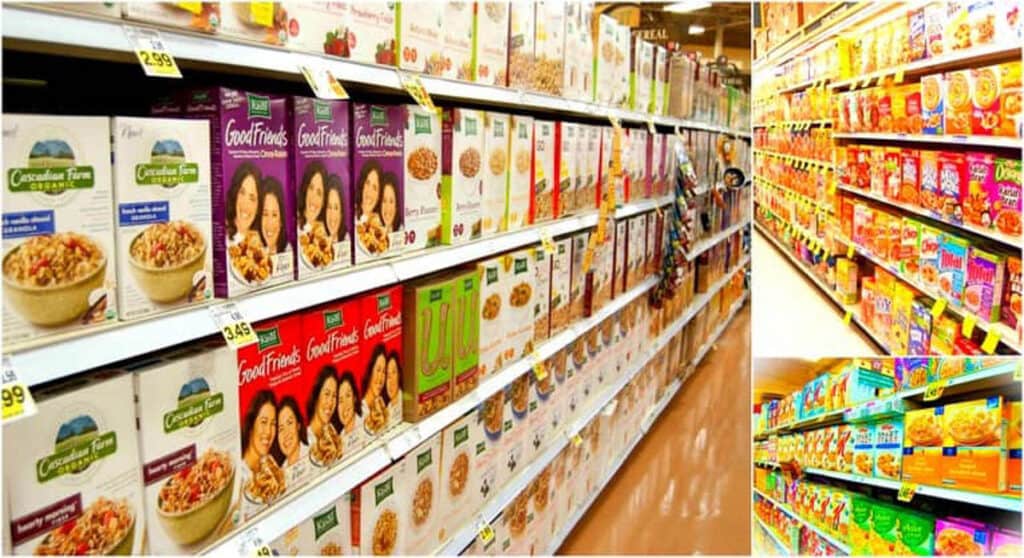
The Top 20 Healthiest Breakfast Cereals
From the healthiest o’s, puffs, crunchy cereal, and flakes, to oats, granola, bran and raisin bran cereal, I have got you covered with this list of the healthiest cereals. I have even included quite a few grain free and gluten free cereals to try that are healthy for you too!
Three Wishes Unsweetened Protein Cereal
Three Wishes is one of the tastiest high-protein cereals I’ve found. It’s also one of my top picks for the best healthy cereals because it has almost everything you’d want in a good-for-you cereal brand.
It’s grain-free, vegan, sugar-free, gluten-free, non-GMO, and paleo-friendly! It’s low in carbs and high in protein and fiber. This healthy cereal comes in 6 flavors (Cinnamon, Honey, Unsweetened, Cocoa, Fruity, and Frosted) giving you something for everyone!
Ingredients: The unsweetened option has just 4 simple ingredients: chickpeas, tapioca, pea protein, and salt. The flavored versions will have these ingredients plus: cane sugar, monk fruit, and natural flavors.
Nutritional Info: 3/4 cup has 120-130 calories, 3 grams fiber, 0 grams sugar (the flavored versions have only 3 grams of sugar), and 8 grams of protein.
Price: (Varies) $7.75 for an 8.6oz box (subscribe & save on Amazon), or $6.64 for an 8.6 ounce box at Thrive Market. Also available in most grocery stores.
Pros
Cons
Seven Sundays Sunflower Cereal
Seven Sundays as a brand overall is definitely one of the healthiest cereal for adults and kids! They are 100% grain-free, gluten-free, dairy-free, whole food based, low-sugar, paleo, vegan, and vegetarian friendly. With a super clean ingredients list like cassava and sunflower protein as the first two ingredients, their cereal is one of the healthiest choices you can make!
They come in 4 flavors – cinnamon, berry, chocolate, and maple. I personally love the cocoa and maple flavors the best, and I eat them daily.
Ingredients: Cassava, Sunflower Protein, Dates, Cocoa Powder, Coconut Sugar, Coconut Oil, Vanilla Extract, Sea Salt
Nutritional Info: 1 cup has 170 calories, 3 grams fiber, 5 grams sugar (1 gram added sugar), and 5 grams protein.
Price: (Varies) $10.85 for an 8 ounce bag at Amazon, $8.69 for an 8 ounce bag at Whole Foods, $6.93 for an 8 ounce bag at Thrive Market. Also found in many grocery stores.
Pros
Cons
Seven Sundays Oat Protein Cereal (Simply Honey)
I love all of Seven Sundays cereal varieties, and this particular one is a great, healthier alternative to Honey Nut Cheerios. It tastes delicious and also comes in 3 other flavors (Maple Cinnamon, Super Fruity, and Chocolate Sea Salt).
What I especially appreciate about Seven Sundays cereal is that it’s made from upcycled oat protein (from oat milk production), and other gluten-free flours like cassava and corn. It’s non-GMO, has no refined sugar, and has no artificial flavors. This is one of the best oat cereal brands because it’s perfectly sweet, crunchy, and packed with whole grains.
Ingredients: Upcycled Oat protein, Upcycled Non-GMO Corn, Cassava Starch, Wildflower Honey, Coconut Oil, Sea Salt.
Nutritional Info: 1 cup has 150 calories, 3 grams fiber, 7 grams sugar, and 5 grams protein.
Price: (Varies) $9 for an 8 ounce package on Amazon (using subscribe & save), or $6.93 at Thrive Market. Also found in many grocery stores.
Pros
Cons
Awsum Snacks SuperCereal (Puffed Quinoa)
Awsumsnacks is the newest healthy cereal I’ve tried. I came across it when I was searching for a gluten-free, low sugar cereal option, and I was so excited when I found this! Their plain Supercereal is made exclusively with 100% Royal quinoa seeds, a nutrient-packed grain that’s high in protein, fiber, and contains all 9 essential amino acids.
They come in 3 flavors – cocoa, cinnamon and plain. I personally like the plain one the best because I just mix it with other cereals and it makes my breakfast more nutrient dense, while taking on the flavors of whatever I mix it with.
Ingredients: Organic quinoa seeds.
Nutritional Info: 1.5 cups has 100 calories, 2 grams fiber, 0 grams sugar, and 4 grams protein.
Price: $7.28 for a 6 ounce package on Amazon.
Pros
Cons
One Degree Foods Sprouted Rolled Oats
Oatmeal is one of my favorite breakfasts to enjoy in the morning. And the great thing about oats is that you don’t have to have them warm — you can make overnight oats and enjoy them cold, just like you would with muesli in the morning!
Organic rolled oats are a lower glycemic option in comparison to their instant oat counterparts – which is beneficial in stabilizing blood sugar and cholesterol levels. Oats are one of the best healthy cereals to eat, because they are packed with nutrition and are rich in B vitamins, have a high fiber content, and host of essential minerals.
One Degree Foods is my favorite brand for rolled oats, because not only are they organic and non-GMO, their oats are sprouted which provides additional health benefits! Sprouted grains have more available vitamins & minerals than regular grains, less starch, and are easier to digest. These oats are also high in fiber and have some protein too!
Oats will always be my go-to for the best sugar-free cereal and least processed cereal option.
Ingredients: Organic sprouted rolled oats
Nutritional Info: 1/3 cup uncooked has 140 calories, 4 grams fiber, 0 grams sugar, and 6 grams protein.
Price: $8.24 for a 24oz package on Amazon, or $7.59 for a 24 ounce package at Thrive Market.
Pros
Cons
Nature’s Path Organic Old Fashioned Rolled Oats
These are my favorite non-sprouted organic rolled oats, and I also love them because Nature’s Path is a brand that you can find in just about any grocery store, making it more available than One Degree Foods.
The first and only ingredient on the nutrition label for this healthy cereal brand is organic rolled oats. I love to top these whole-grain oats with sliced bananas, a handful of berries, or a drizzle of peanut butter for a filling and complete meal!
Ingredients: Organic whole grain rolled oats
Nutritional Info: 1 cup of cooked rolled oats has 150 calories, 3 g fat, 27 g carbs, 4 g fiber, 0-1 g sugar, and 5 g protein.
Price: $3.72 for an 18oz package on Amazon, also available in most grocery stores.
Pros
Cons
Lovebird Organic Grain-Free Cereal
I absolutely love Lovebird cereal! They are made with super clean ingredients, nothing artificial and are 100% USDA organic, non-GMO, vegan, gluten-free, grain-free, paleo, whole30, refined-sugar-free and common allergen friendly. Their primary ingredient is cassava, which is a sustainable root vegetable, a good source of prebiotic fiber, and high in resistant starch to help control blood sugar.
They come in 4 flavors: honey, cinnamon, cacao and unsweetened. This cereal tastes great, my kids love it, and I’ll use it as cereal, as a topping for oatmeal or smoothie bowls, in trail mix, or just as a snack on it’s own!
Ingredients: Organic cassava flour, organic coconut flour, organic coconut oil, sea salt (for the unsweetened, plain variety). Note — the different flavors will also include spices like cinnamon, organic coconut sugar and organic honey.
Nutritional Info: 3/4 cup has 100 calories, 4 grams fiber, 2-6 grams sugar depending on the flavor, 2 grams protein
Price: (Varies) $9.99 for a 7 ounce box on Amazon, $8.99 for a 7 ounce box at Thrive Market, and also available at some Costco locations and other grocery stores.
Pros
Cons
Catalina Crunch Cereal
Catalina Crunch’s cereal is a good option for anyone looking for a high-protein gluten-free cereal. It’s non-GMO, some of the ingredients are also organic, it’s gluten-free, vegan, keto-friendly, low-carb, and made from pea protein!
I love eating this as a healthy snack, mixing it with other cereals, or adding it to trail mix. It’s super versatile and I also use it as an easy way to get more vegan-friendly protein into my diet!
This cereal is 100% sugar-free, and is sweetened with monk fruit, which means it tastes great without spiking your blood sugar.
It comes in 8 different flavors and I’ve noticed that they keep releasing new flavors, so you’re guaranteed to get variety with this cereal! I’ve tried all of their flavors and I personally like the Cinnamon Toast one the best.
Ingredients: Catalina Flour (Organic Pea Protein, Potato Fiber, Non-gmo Corn Fiber, Chicory Fiber, Acacia Fiber, Guar Gum, Turmeric), Tapioca, Catalina Oil (Organic High Oleic Sunflower Oil, Avocado Oil), Baking Powder, Natural Flavors, Sea Salt, Calcium Carbonate, Vitamin E, Monk Fruit, Cinnamon
Nutritional Info: 0.5 cups has 110 calories, 9 grams fiber, 0 grams sugar, and 11 grams protein.
Price: (Varies) $5.99 for a 8 ounce package on Amazon with subscribe & save. Also available in many grocery stores.
Pros
Cons
Nature’s Path Organic Puffed Kamut
This Nature’s Path cereal has just one ingredient – organic whole-grain Kamut Khorasan wheat. Free from artificial flavors, preservatives, and colors, it is certified USDA organic, vegan, and non-GMO.
I used it as a substitute for rice krispies since it’s more nutritious and has a cleaner ingredients list. It’s one of the lowest calorie cereals that you can’t really go wrong with!
Ingredients: Organic whole grain kamut khorasan wheat
Nutritional Info: 1 cup has 50 calories, 2 grams fiber, 0 grams sugar, and 2 grams protein.
Price: $3.41 for a 6oz bag.
Pros
Cons
Nature’s Path Flax Plus Flakes
I love this cereal as a great alternative to corn flakes or bran flakes! It’s the healthiest bran cereal option I’ve found that’s widely available in grocery stores. These flax-based flakes are hearty, filling, and packed with healthy fats thanks to the omega-3-rich flaxseeds. This cereal is organic, Non-GMO, vegan, kosher, and very slightly sweet.
Ingredients: Whole Wheat Flour, Wheat Bran, Evaporated Cane Juice, Flax, Oat Bran, Barley Malt Extract, Sea Salt, tocopherols (Natural Vitamin E)
Nutritional Info: 1 cup has 150 calories, 7g fiber, 5g sugar and 5g protein.
Price: $3.79 for a 13.25oz box on Amazon, also found in many grocery stores.
Pros
Cons
Cascadian Farm Organic Purely O’s
This is my favorite healthy alternative to regular Cheerios! Regular Cheerios are not organic and are high in glyphosate residue (a pesticide).
But Cascadian Farms tastes just like regular Cheerios, and they are made with 100% organic and non-GMO ingredients which means you don’t have to worry about pesticide residue on your cereal! It’s crunchy and mild – and is also great for a toddler/kid finger food or cereal snack.
Ingredients: Whole grain oats, whole grain barley, wheat starch, malted barley extract, sea salt, calcium carbonate, oats, malted barley, vitamin e (mixed tocopherols) added to preserve freshness.
Nutritional Info: 1.5 cups has 140 calories, 4 grams fiber, 1 gram sugar, and 4 grams protein.
Price: $6.49 for a 8.6 ounce box on Amazon, also available in most grocery stores.
Pros
Cons
Barbara’s Original Puffins
This is my top pick among all of the Barbara’s Cereals line, and it is also one of the most popular cereals I’ve found for kids that’s actually healthy! It has simple ingredients, is non-GMO, crispy, and slightly sweet. Enjoy this healthy cold cereal with low-fat milk, or your favorite plant-based milk like unsweetened almond milk or oat milk.
Ingredients: Yellow corn flour, corn bran flour, unsulphured molasses, whole oat flour, expeller pressed high oleic oil (canola and/or sunflower), salt, baking soda, vitamin c (ascorbic acid), natural vitamin e (mixed tocopherols to maintain freshness)
Nutritional Info: 1 cup has 130 calories, 6g fiber, 6g sugar and 3g protein.
Price: (Varies) $6.70 for a 10 ounce box on Amazon, also found in most grocery stores.
Pros
Cons
Barbara’s Shredded Spoonfuls Multigrain
I’ve used this healthy whole grain cereal as a great alternative to shredded wheat (especially frosted shredded wheat)! It is non-GMO, has no high fructose corn syrup (frosted shredded wheat does have high fructose corn syrup), is vegan-friendly, and is sweetened with molasses instead of refined sugar.
Ingredients: Whole oat flour (with added oat bran), yellow corn flour (with added corn bran), unsulphured molasses, whole wheat flour, salt, baking soda, natural vitamin e (mixed tocopherols to maintain freshness), vitamin c (ascorbic acid)
Nutritional Info: 1 cup has 140 calories, 5g fiber, 7g sugar, and 5g protein.
Price: $5.49 for a 14 ounce box on Amazon, price also varies in grocery stores.
Pros
Cons
Uncle Sam Toasted Whole Wheat Berry Flakes & Flaxseed
This cereal has only 4 ingredients and is non-GMO and vegan. This honestly would be my #1 pick taste-wise for a truly sugar-free cereal, but it’s not organic and it can be pretty bland. I recommend buying this and mixing it with one of the best healthy cereals above (50-50) to bring a little more flavor to your cereal bowl or add it to trail mix!
Ingredients: Whole grain wheat, flaxseed, barley malt, salt.
Nutritional Info: 3/4 cup of this low sugar, high-fiber cereal has 220 calories, 10g fiber, 0g sugar and 8g protein.
Price: $6.12 for a 10 ounce box on Amazon.
Pros
Cons
KIND Granola Oats & Honey
I’m always on the lookout for lower sugar granola, because while granola is delicious, most brands are not healthy for you and are super high in sugar and calories!
But this healthy low sugar cereal from KIND is gluten-free, non-GMO, slightly sweet, and the perfect topping for Greek yogurt or smoothie bowls. A fantastic option for anyone who loves granola but not all of the sugar that they are usually made with!
Ingredients: Oats, tapioca syrup, brown rice, cane sugar, honey, millet, oat flour, coconut, canola oil, buckwheat, amaranth, molasses, quinoa, brown rice syrup, sea salt, Vitamin E (tocopherols to maintain freshness).
Nutritional Info: 1/3 of a cup has 110 calories, 2g fiber, 5g sugar and 2g protein.
Price: $7.90 for an 11 ounce package on Amazon, also found in many grocery stores.
Pros
Cons
Bear Naked Fit Vanilla Almond Crunch Granola
These crunchy clusters are another one of my top picks for healthy granola! They’re non-GMO, made with whole grain oats and hearty almonds.
This cold low calorie cereal is also a great low-sugar granola – it has 45% less sugar than most leading granola brands!
I’ll add this into smoothies to thicken them up, use it as a topping for oatmeal, yogurt bowls, smoothie bowls, and more. My kids love it too!
Ingredients: Whole grain oats, brown rice syrup, almonds, cane sugar, oat bran, brown rice, ground flax seeds, natural flavors.
Nutritional Info: 1/4 cup has 120 calories, 2g fiber, 3g sugar and 3g protein.
Price: $7.99 for a 12 ounce bag on Amazon, also found in many grocery stores.
Pros
Cons
Purely Elizabeth Granola, Original Flavor
This granola is certified USDA organic, non-GMO, and made with a variety of ancient grains including quinoa, amaranth, and chia seeds (which are rich in omega-3 fatty acids). It is one of my favorite healthy breakfast cereals, because it’s sweetened with coconut sugar which is a lower glycemic sweetener – so your blood sugar remains more stable when you eat this. This is one of the best healthy cereal brands if you’re looking to get your granola fix.
It comes in over 8 flavors, and all of them taste amazing. My kids love it too!
Ingredients: Organic Gluten-Free Oats, Organic Coconut Palm Sugar, Organic Raw Virgin Coconut Oil, Organic Sunflower Seeds, Organic Puffed Amaranth, Organic Millet Flakes, Organic Quinoa Flakes, Organic Chia Seeds, Organic Cinnamon, Salt.
Nutritional Info: 1/3 of a cup has 130 calories, 2g fiber, 7g sugar, 3g protein.
Price: $5.67 for a 12 ounce bag on Amazon, also available in many grocery stores.
Pros
Cons
Seven Sundays Blueberry Chia Buckwheat Muesli
Of course, Seven Sundays does it again with one of teh best healthy muesli brands I’ve found on the market today! This cereal is certified gluten-free, non-GMO, and made with wild blueberries, pumpkin seeds, and chia seeds for more protein. It has half the sugar and twice the protein when compared to most other brands. I like to enjoy it cold or hot with milk or water, or even use it as a topping for yogurt or oatmeal!
Ingredients: Gluten-free oats, sorghum flakes, buckwheat groats, blueberries (blueberries, apple juice), unsweetened coconut chips (no sulfites), apples, organic honey, pumpkin seeds, chia seeds, lemon extract
Nutritional Info: 1/2 cup has 240 calories, 6g fiber, 4g added sugar (7 grams total sugar) and 8g protein.
Price: (Varies) $15 for a 32 ounce bag (equates to $7.50 for a 16 ounce bag) on Amazon, $6.79 at Thrive Market, also available in some grocery stores.
Pros
Cons
Ezekiel 4:9 Organic Sprouted Whole Grain Cereal, Original
Ezekiel makes some of the most nutritious cereal – it’s certified USDA organic, made with sprouted live grains, legumes, and seeds, and has absolutely no flour! This is one of the healthier options for boxed cereal. They have a few other flavors (Almond, Golden Flax, etc.) that are equally good for you!
I think this is a great option if you are watching your sugar intake. But just like the Uncle Sam cereal, I’ve thought this was a little on the bland side and works well when paired with another cereal 50-50. The texture of this cereal is also not for everyone – I’ve found it to be quite crunchy!
Ingredients: Organic Sprouted Whole Wheat, Organic Malted Barley, Organic Sprouted Whole Barley, Organic Sprouted Whole Millet, Organic Sprouted Whole Lentils, Organic Sprouted Whole Soybeans, Organic Sprouted Whole Spelt, Filtered Water, Sea Salt.
Nutritional Info: 1/2 cup has 190 calories, 6g fiber, 0g sugar and 8g protein.
Price: $8.66 for a 16 ounce box on Amazon, also available in most grocery stores.
Pros
Cons
Nature’s Path Flax Plus Raisin Bran
While dried fruit based cereals may not be the healthiest cold cereals to eat, this particular brand is a great alternative to traditional Kellogg’s Raisin Bran (which has tons of sugar – 18 grams per serving).
The Nature’s Path version on the other hand, is high in fiber and contains healthy fats from the flax seeds. This cereal has only 4.8 grams of added sugar (10.4 grams of total sugar) for each 1-cup serving. Now that’s a raisin bran I can get behind!
Ingredients: Organic whole wheat meal, organic raisins (coated with organic sunflower oil), organic wheat bran, organic cane sugar, organic flax seeds, organic oat bran, organic barley malt extract, sea salt, tocopherols (vitamin E).
Nutritional Info: 168 calories for 1 cup, 7.2 grams fiber, 10.4 grams sugar (only 4.8 grams added sugar) and 5 grams protein. (Note: 1.25 cups has 210 calories, 9 grams fiber, 13 grams sugar / 6 grams added sugar, and 6 grams protein).
Price: $4.33 for a 14 ounce box on Amazon, also available at many grocery stores.
Pros
Cons
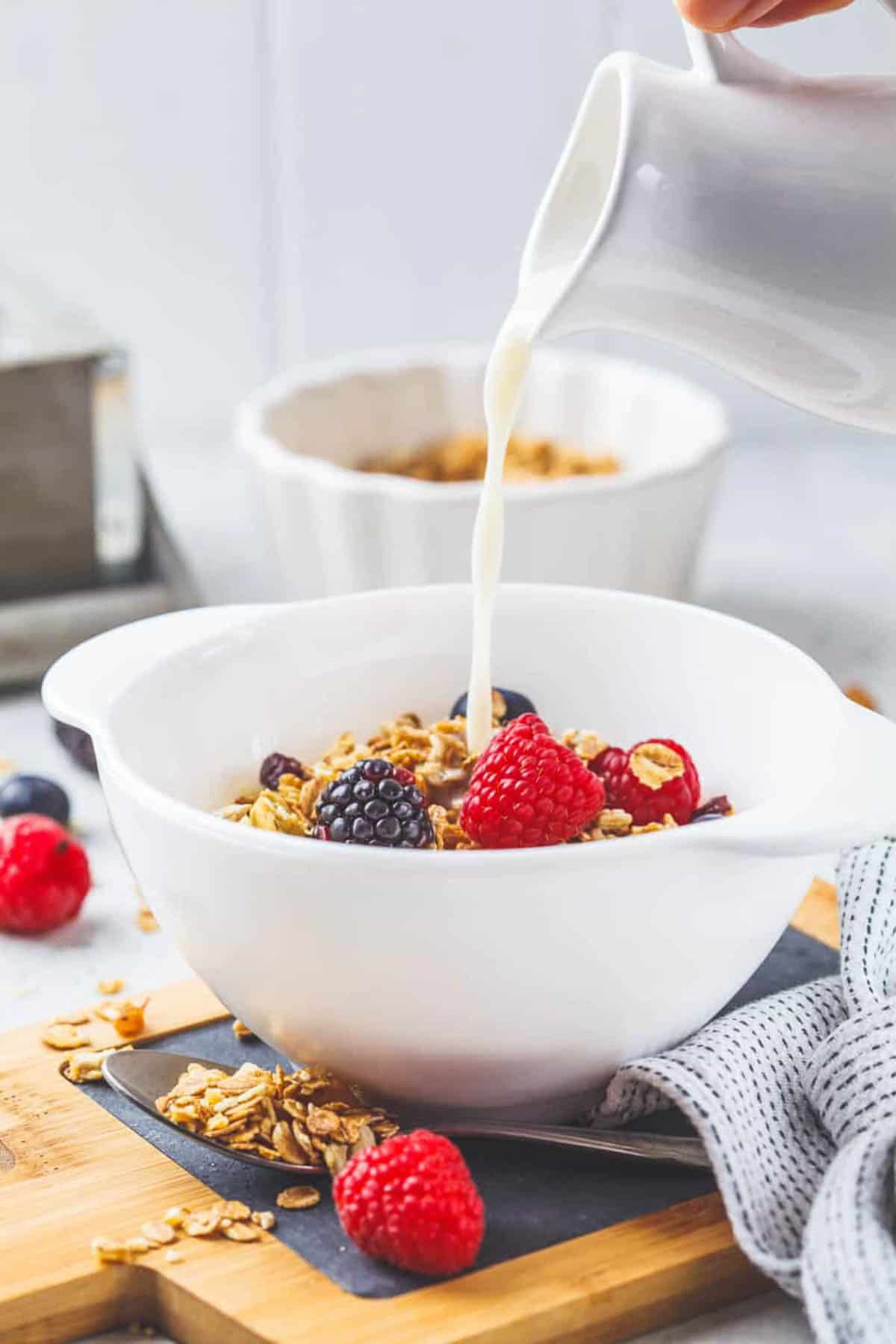
What Are The Healthiest Cereals To Eat?
A good healthy cereal for adults and kids will have a short ingredient list, at least 4-5 grams of fiber, 3 grams of protein, and less than 6 grams of sugar per serving.
The best cereals I have found are made with organic, whole food ingredients and use “whole grain”, “bran”, “whole wheat” or grain-free sources. They are also minimally processed, so they don’t have soy, preservatives, artificial colors, or flavors. Healthy cereal brands will have a well-rounded nutritional value profile and be under 200 calories per ¾-1 cup serving.
What Ingredients Should You Avoid In Breakfast Cereals?
As a general rule of thumb, I recommend steering clear of artificial ingredients and food dyes, hydrogenated oils, extra sugar, GMOs, harmful chemicals like glyphosate (Source: CBS News), and additives/preservatives like BHT, BHA, or fortified vitamins. The healthiest breakfast cereal will not contain any of these ingredients.
What Are The Least Healthy Cereals?
Most general mills or Kellogg’s fortified breakfast cereals aimed at kids (Lucky Charms, Golden Grahams, Froot Loops, etc.) are super unhealthy because they’re high in sugar (which leads to those sugar highs and crashes), low in fiber, and contain artificial flavors and colors. Any cereal that has more than 8-9 grams of sugar per serving and contains artificial colors, flavors, or preservatives is likely to be pretty unhealthy for you (Source: NCBI).
Healthy Cereal FAQs
Raisin Bran is certainly a popular cereal, but unfortunately, the most common Raisin Bran cereal brands (made by Kellogg’s and Post) are not healthy for you. The name sounds healthy, but it’s actually loaded with calories and sugar. Raisins are dried fruit which is concentrated in sugar since they don’t contain water like fresh fruit.
One serving size of Post’s Raisin Bran cereal (1.25 cups) contains 210 calories and 20 grams of sugar. One serving of Kellogg’s (1 cup) contains 190 calories and 17 grams of sugar. That’s almost the same amount of sugar in a can of Coke or a regular-sized Snickers Bar! For a healthy Raisin Bran-type cereal, I recommend trying Nature’s Path Flax Plus Raisin Bran instead.
The best healthy cereal to eat for breakfast is any cereal that is organic, high in fiber (at least 5 grams per serving), low in sugar (under 6 grams per serving), has protein (at least 3 grams per serving but ideally more), under 200 calories per serving, and has no preservatives or artificial colors/flavors added.
The least processed breakfast cereals are the ones with single whole-food ingredients like plain rolled whole oats and kamut puffs. All of the cereals listed in this article are minimally processed compared to other highly processed cereal brands.
In my opinion, it depends! Granola typically runs into the same problem as Raisin Bran – way too much sugar and calories packed into a small serving!
Making granola at home will result in healthier granola since you can control the amount of sugar and fat added to the recipe (like this low calorie granola recipe that is super low in sugar!)
If you are looking for a pre-made/store-bought granola, follow the same rules as you would when looking for an actually healthy cereal (low in sugar, high in fiber). I like KIND Granola, Bare Naked Fit Granola, and Purely Elizabeth Granola. Remember portion size matters – you can go overboard even with the healthy granola brands if you eat more than 1 serving per day!
Grape Nuts cereal is actually pretty healthy! It’s the best choice of conventional breakfast cereals that I’ve found. It’s non-GMO, has only 4 ingredients (whole grain wheat flour, malted barley flour, salt, dried yeast), and has 7 grams of fiber, 5 grams of sugar, and 6 grams of protein per serving.
The only downside to Grape Nuts is that it’s super calorie-dense and is not a granola (which is the only type of cereal I’d expect more calorie density). Grape Nuts has 400 calories for a 1-cup serving (200 calories for 1/2 cup), which is why I didn’t include it on my list of healthy cereals above!
None of the cereals in the above list contain BHT! BHT is an ingredient used to maintain freshness in many ultra-processed cereals. In is currently banned in Japan, Europe, Canada, Australia, and New Zealand due to it being classified as a carcinogen (Source: Science Direct).
While BHT is approved by the Federal Drug Administration for use in limited amounts in certain foods, it is controversial, and more research is needed to understand the potential long-term effects of consumption (Source NCBI).
Weetabix is technically less processed than other higher-processed cereals with greater amounts of added sugar, flavorings, chemicals, and dyes. It is made with 95% whole grain wheat, malted barley extract, sugar, salt, niacin, iron, riboflavin (B2), thiamin (B1), and folic acid. Weetabix cereal is a good source of whole grains, is high in fiber, and contains 4 grams of protein per serving
On the surface, Cheerios look healthy: one serving (1.5 cups) has 140 calories, 4 grams of fiber, 2 grams of sugar, and 5 grams of protein (and they are gluten-free).
However, because Cheerios are not organic, they have been found to contain high levels of the carcinogen glyphosate – so I wouldn’t recommend them! Instead, try Cascadian Farms Purely O’s.
If you’re trying to lose weight, you might wonder if cereal is healthy. The answer here is: it depends! I’ve found that it truly depends on the type of cereal you’re eating and how frequently you’re eating it.
If you’re choosing low-sugar cereals that have high fiber, lower calories, and are a good source of protein, then eating one bowl of cereal per day can certainly be part of a diet for weight loss (Source: Insider). On the other hand, if you’re loading up on sugary cereals multiple times a day, that can be a recipe for weight gain!
There are a few healthier cereal brands that I love, that have no sugar added! All of the best healthy cereals listed below are low in sugar, but cereals with no sugar include plain oatmeal / rolled oats, Three Wishes Grain-Free Unsweetened Cereal, Lovebird Organic Unsweetened Cereal, Nature’s Path Organic Puffed Kamut, Awsum Snacks Quinoa Cereal, and Uncle Sam Toasted Whole Wheat Berry Flakes & Flaxseed.
I hope this list of delicious healthy cereals helps you to pick out a great and satisfying cereal – it’s the perfect excuse to make a healthy start to your day! Also, check out some of my delicious healthy eating guides!
- The Healthiest Nut Butter
- Best Multivitamins for Kids
- The Healthiest Baby Food Pouches
- Healthiest Milk Options
More Healthy Breakfast Recipes
- Eggs in a Basket
- Healthy Sweet Potato Breakfast Hash
- Oat Flour Pancakes
- How To Make Oatmeal Taste Good
- Vegan Breakfast Cookies
- Breakfast Fruit Salad
- Overnight Weetabix
Love this healthy eating guide? Please leave a 5-star rating 🌟 in the recipe below and/or a review in the comment section further down the page!
You can also FOLLOW ME on FACEBOOK, INSTAGRAM, and PINTEREST to see more delicious, healthy, family-friendly food, and if you have any questions, I’m here to help!



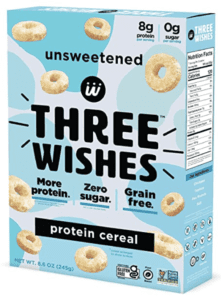
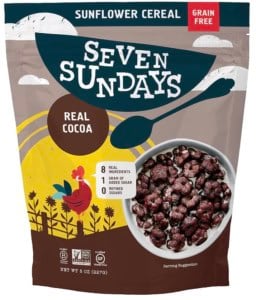
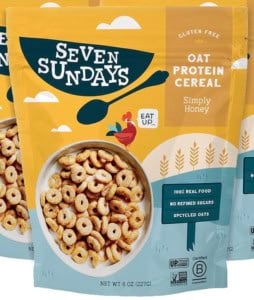
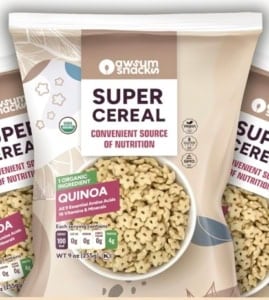
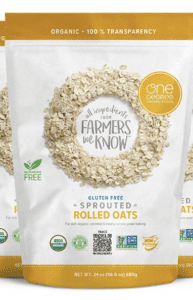
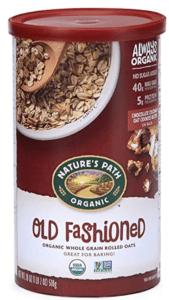
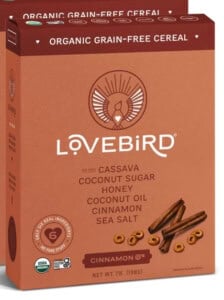
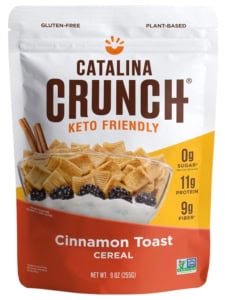
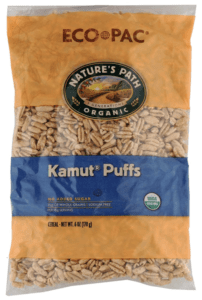
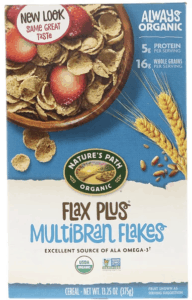
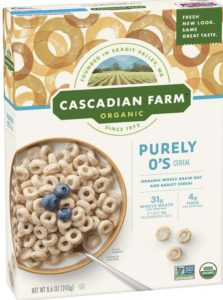
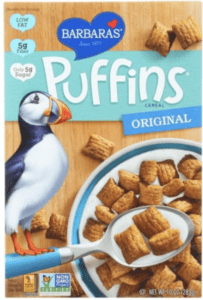
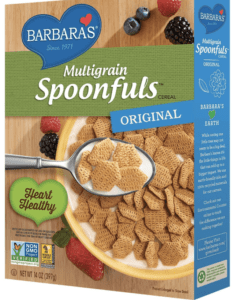
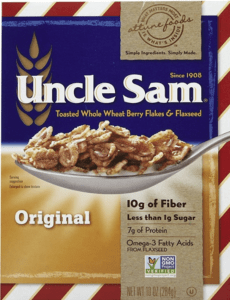
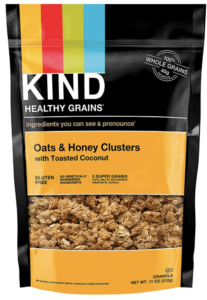
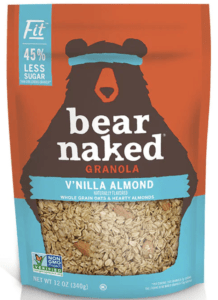
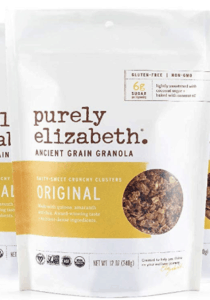
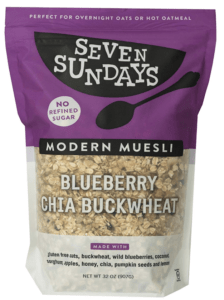
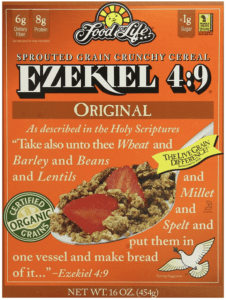
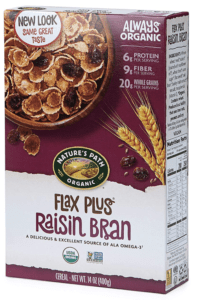





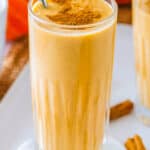
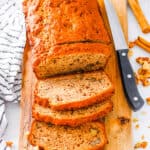


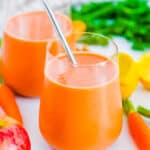
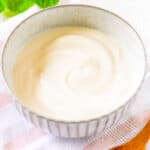
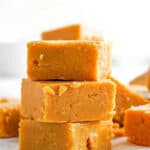
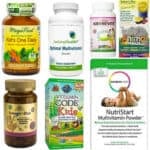
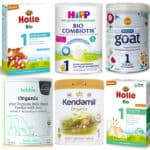



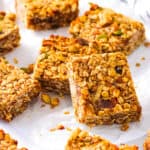




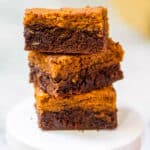
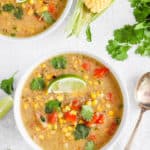

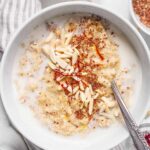
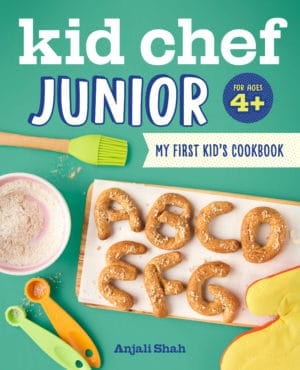


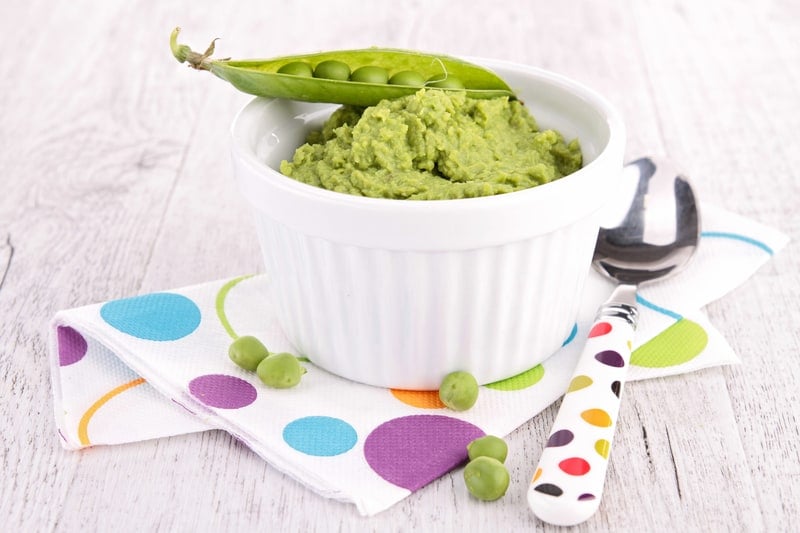
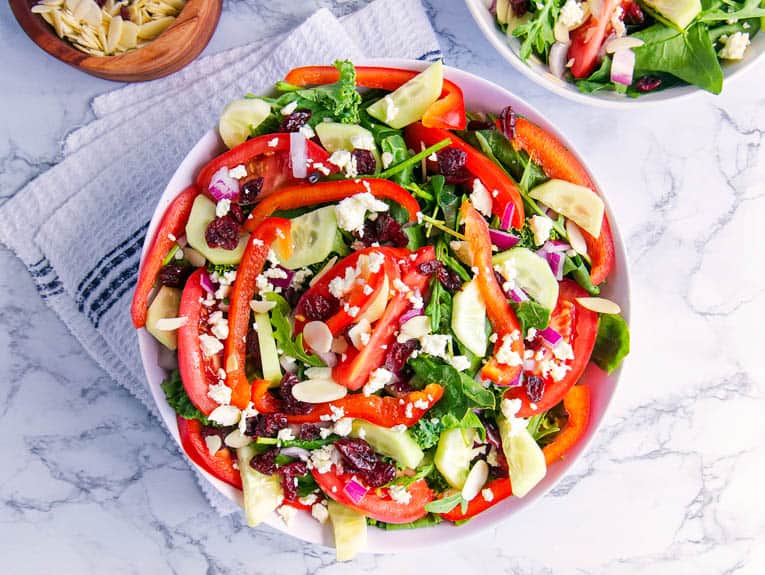


WOW – thanks for a thorough list of cereals, their ingredients & nutritional info. I’ve recently discovered that most of the food I have been eating contains NATURAL FLAVORS. This wording is a “lie”; a big misuse of trusted word – “natural.” I don’t want to consume these ingredients if they are chemicals. As I was reading through your list, I found a number of cereals that looked promising until I reached the wording NATURAL FLAVORS. What’s up with food manufacturers these days? Is it easier/cheaper to use chemicals rather than the real ingredients? If the consumer knew which NATURAL FLAVORS were okay, that would be helpful. However, this category is suspicious. Your information about GRAPE NUTS is interesting and might be a good choice for me. Might try the Kamut Puffs, too & mix together as you suggested. Thanks again!!!
I agree with you about natural flavors – it is tough because the FDA doesn’t require any sort of “disclosure” around what’s included in those natural flavors. In general, I have to assume that the brands with strong missions (organic, etc.) are using actual natural flavors, but you never know. No packaged food is 100% perfect so I’m just trying to optimize for the best options out there! I’m glad this post was helpful for you!
How about Multi-Grain Cheerios and Shreddies Cereal? I’m from Canada and we have been eating both for a while now as an attempt to maintain a minimal sugar level for cereal. Was not aware of glycoside concern though. Also, we vacation in the USA in the winter and just can’t find Shreddies cereal anywhere! So we bring boxes from Canada when we travel. Are you aware of Shreddies cereal? Are they accessible option?
Hi Sandra! I don’t think we have Shreddies Cereal in the US so I’m not familiar with it unfortunately! My main issue with Multi-Grain Cheerios is the glyphosate issue in the US. Not sure if that’s the same issue in Canada though! If you want to email me the nutritional info for Shreddies Cereal I can tell you what I think though!
Shreddies cereal in Canada is made by Post which I believe is an American company
Got it! Thanks for letting me know. Even though it’s made by Post (which is an American company), it might not have the same glyphosate issues as Post cereals do in the US because Canada has different regulations that US food companies have to adhere to in order to sell there. But I just don’t know for sure!